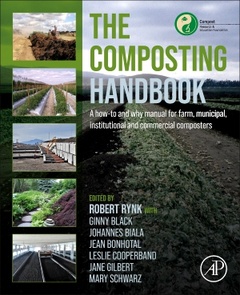The Composting Handbook A how-to and why manual for farm, municipal, institutional and commercial composters
Coordonnateurs : Rynk Robert, Black Ginny, Gilbert Jane, Biala Johannes, Bonhotal Jean, Schwarz Mary, Cooperband Leslie

The Composting Handbook provides a single guide to the science, principles and best practices of composting for large-scale composting operations facing a variety of opportunities and challenges converting raw organic materials into a useful and marketable product.
Composting is a well-established and increasingly important method to recycle and add value to organic by-products. Many, if not most, of the materials composting treats are discarded materials that would otherwise place a burden on communities, industries, farms and the environment. Composting converts these materials into a valuable material, compost, that regenerates soils improving soils for plant growth and environmental conservation.
The Composting Handbook expands on previously available resources by incorporating new information, new subjects and new practices, drawing its content from current scientific principles, research, engineering and industry experience. In both depth and breadth, it covers the knowledge that a compost producer needs to succeed. Topics include the composting process, methods of composting, equipment, site requirements, environmental issues and impacts, business knowledge, safety, and the qualities, uses and markets for the compost products.
The Composting Handbook is an invaluable reference for composting facility managers and operators, prospective managers and operators, regulators, policy makers, environmental advocates, educators, waste generators and managers and generally people interested in composting as a business or a solution. It is also appropriate as a textbook for college courses and a supplemental text for training courses about composting or organic waste management.
2. Enterprise Planning
3. The Composting Process
4. Compost Feedstocks
5. Passively Aerated Composting Methods, Including Turned Windrows
6. Forced Aeration Composting, Aerated Static Pile, and Similar Methods
7. Contained Composting Methods and Methods Summary
8. Composting Animal Mortalities
9. Compost Operations and Equipment
10. Site Planning, Development, and Environmental Protection
11. Process Management
12. Odor Management and Community Relations
13. Safety and Health Principles and Practices
For Composting Facilities
14. Facility Management
15. Compost Quality and Testing
16. Compost Use
17. Compost Use for Plant Disease Suppression
18. Compost Marketing and Sales
19. Composting Economics
Ginny Black served on the Compost Councils Research and Education Foundation Board of Trustees since 1995, chairing the organization since 2014. She served on the US Composting Council's Board of Directors from 1995 to 2010. She currently chairs the Minnesota Composting Council (MNCC), a non-profit organization founded in 2012. The MNCC is a State Chapter of the US Composting Council, working with composters, businesses, and the public sector to divert and process organic materials to compost facilities. Ginny served as a technical staff person for recycling and composting with the Minnesota State Agency's from 1987 to 2013, setting up recycling and composting programs throughout the state of MN. In her last 12-years she focused exclusively on promoting reduction and composting of organic materials. She also served on the City of Plymouth's city council from 1995 to 2013 and was the Councils Representative to the City's Environmental
- Created in conjunction with the Compost Research and Education Foundation (CREF)
- Includes the latest information on composting and compost, providing the first comprehensive resource in decades
- Written with focus on both academic and industrial insights and advances
Date de parution : 12-2021
Ouvrage de 1002 p.
19x23.4 cm
Thèmes de The Composting Handbook :
Mots-clés :
composting; compost; organics; recycling; waste; soil; conservation


